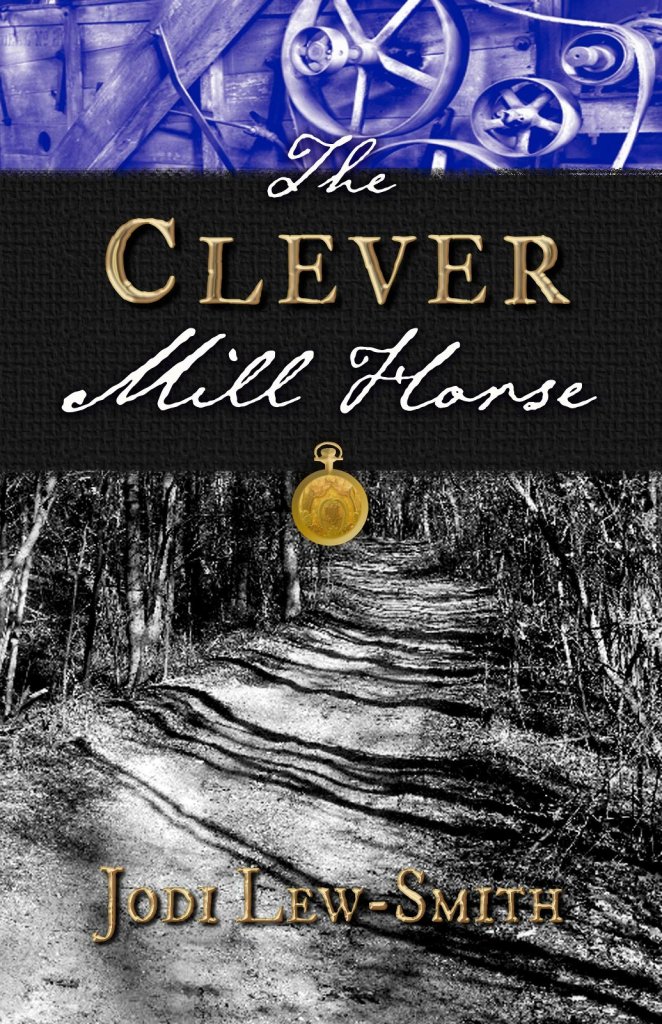Oliver Evans: Genius inventor or crackpot?
 First a warm thank you to Amy for hosting my guest post on her amazing blog!
First a warm thank you to Amy for hosting my guest post on her amazing blog! Oliver Evans—who appears in The Clever Mill Horse as the curmudgeon inventor who helps Ella write the patent that will beat out Henry Emerston—was quite a real man and apparently as much a genius for inventing things as for stirring up trouble. His best known inventions were the automatic flour mill (a suite of tools for automating the backbreaking labor of flour milling) and then, later in his life, the high-pressure steam engine for use in a multitude of applications.
Born 1755 in the colonial town of Newport, Delaware, Evans was apprenticed at 17 to a wheelwright and wagonmaker. He served in the Delaware militia in the Revolutionary War but saw little action. At 22 he turned from wheelwrighting to designing and selling a new type of “textile card,” which was a type of comb to clean wool or cotton prior to spinning. (Hence the word “carding!”). By his middle twenties he was drawn into solving the problems of flour milling when he and two of his brothers went into business to build a mill together—and outfitting the mill became his job. Soon he was so obsessed with his ideas for “automated flour milling” that he could speak of little else. (Which didn’t make him especially popular. Hezekiah Niles, who was a boy at the time, recalled him as someone people thought “would never be worth any thing, because he was always spending his time on some contrivance or another.”)
The basic problem of the flour mill was that wheat kernels ground by millstones on the first floor then had to be manhandled in sacks up to the top floor of the mill to be cooled and dried, then fed down into a bolting cylinder to be sifted, then delivered into barrels back on the first floor. The whole process took upwards of eight men and many hours. Evans set out to automate the entire process using an integrated set of bucket elevators for lifting, screw conveyors for lateral movement, and something called a ‘hopper boy’ that cooled and dried the meal before sending it down into the bolting cylinder. When fully operational, sacks of grain could be delivered at the door to the mill and then, later, barrels of flour picked up without the need for a human being to touch the flour at any step. Occasional adjustments to the machinery became the only use for a man at the mill.
Oliver Evans was not the first to invent automation. At this time in the 1780’s there were already machines in operation in textiles, grain threshing, and nail-making, and there were millers using “sack tackles” in England and France to hoist sacks of flour to the top of the mill by means of water-power. What was so stunning about Evans’ achievements were that he didn’t seek to automate one or two of the pieces, but instead to fully automate every piece. Up to now, no one had automated an entire process for anything. Evans was the first. He was, in some sense, the ultimate initiator of the industrial revolution. And, as would soon be shown, he was greatly ahead of his time—and perhaps not the ideal choice for Director of PR.
His brilliant inventions were met largely with derision. The Quaker owners of the famous “Brandywine mills” (flour mills lining Brandywine Creek) were pointedly lacking in enthusiasm and one of them told him, “Ah! Oliver, you cannot make water run up hill, you cannot make wooden millers!”
Evans was undeterred and in January 1786 petitioned the Delaware legislature for a patent that gave him exclusive right to make his milling improvements or to license others to do so for a period of twenty-five years. When the federal patent act was passed in 1790, his automated flour milling became the third United States patent ever issued. (Prior to this you had to apply in each state individually).
He went on to write a book called The Young Mill-wright and Miller’s Guide that was eventually issued in fifteen editions between 1795 and 1860. His fortunes improving, he moved to Philadelphia with his wife and children and set up a profitable shop that sold and distributed milling supplies. He was successful as a merchant but his interest continued to lay with invention and he forever stretched his means with experimenting on new devices. He also remained his own worst enemy by spending inordinate time wrangling in lawsuits over patent infringement and engaging in furious correspondence over matters that could easily have been left to die of neglect. He wrote with continual bitterness of the people who had scorned his flour milling innovations early on and, in general, made enemies much more quickly than he made friends. Which is, perhaps, why Eli Whitney and Thomas Edison are household names but almost no one has heard of Oliver Evans. (There’s a lesson in this somewhere!)
Despite his lack of personal stature, his flour-milling inventions took on a life of their own and soon came to be adopted in pretty well every mill in the country. He managed to have his federal patent extended by a private bill called “An Act for the relief of Oliver Evans” and President Jefferson paid him a license fee of $80 to use the inventions in his mill at Monticello. More importantly, the concept of automating entire processes began to be adapted to other applications and this, more than anything else, marked the end for the Age of Homespun and the shift away from an agrarian society. A pretty significant achievement for a largely unknown inventor.
I had great fun developing Oliver Evans as a cameo character in The Clever Mill Horse because he was so well established as an argumentative curmudgeon in history that it took little to make him a genius grump within the story!
References:
Ferguson, Eugene S. Oliver Evans: Inventive genius of the American industrial revolution. The Hagley Museum, Greenville, DE, 1980.
Latimer, Rev. George A. A Sketch of the life of Oliver Evans, A Remarkable Mechanic and Inventor. John C. Harkness, Wilmington, DE, 1872.
Bathe, Greville and Bathe, Dorothy. Oliver Evans: a chronicle of early American engineering. Historical Society of Pennsylvania, Philadelphia, PA, 1935.
About the Book
Publication Date: August 15, 2014 | Caspian Press | Formats: eBook, Paperback
Pages: 424
Genre: Historical Fiction
Winner of the 2014 James River Writers Indie Novel Contest.
A young woman’s gift could weave together the fabric of a nation...
1810, upstate New York. 21-year-old Ella Kenyon is happiest gliding through the thick woods around her small frontier town, knife in hand, her sharp eyes tracking game. A gift for engineering is in her blood, but she would gladly trade it for more time in the forest. If only her grandfather's dying wish hadn't trapped her into a fight she never wanted.
Six years ago, Ella's grandfather made her vow to finish his life's work: a flax-milling machine that has the potential to rescue her mother, brother, and sister from the brutality of life with her drunkard father. The copious linen it yields could save her struggling town, subjugate the growing grip of southern cotton. Or it could be Ella's downfall. If she's not quick enough, not clever enough to succeed, more than her own life rests in the balance...
Praise for The Clever Mill Horse
“Jodi Lew-Smith's The Clever Mill Horse is that rarest of all contemporary novels: an authentically old-fashioned adventure story, in all the best senses. Full of drama, humor, plot surprises, and, best of all, memorable characters, The Clever Mill Horse had me hooked from page one. Best of all, there's a sequel coming. I can't wait.” - Howard Frank Mosher, author of Where the Rivers Flow North“In this delightful debut novel set in the early 19th century, a young woman fights to patent her flax-milling machine. . .An assured, cleverly plotted piece of historical fiction with an irrepressible female protagonist.” - Kirkus Reviews
“. . .intricately plotted and exceedingly well paced. . . filled with danger, science, and suspense, the story rings true with historical and natural detail. . . a complete and finely polished first novel.” - Foreword Reviews
Buy the Book
AmazonNook
Google Play
Kobo
About the Author
Jodi Lew-Smith lives on a farm in northern Vermont with her patient husband, three wonderfully impatient children, a bevy of pets and farm animals, and 250 exceedingly patient apple trees which, if they could talk, would suggest that she stop writing and start pruning. Luckily they’re pretty quiet.With a doctorate in plant genetics, she also lives a double life as a vegetable breeder at High Mowing Seeds. She is grateful for the chance to do so many things in one lifetime, and only wishes she could do them all better. Maybe in the next life she’ll be able to make up her mind.
For more about Jodi and about the lives and world of the characters in the novel, visit her website or blog. You can also connect with her on Facebook and Goodreads.
The Clever Mill Horse Blog Tour Schedule
Wednesday, November 12Spotlight at Flashlight Commentary
Thursday, November 13
Guest Post & Giveaway at Passages to the Past
Friday, November 14
Spotlight & Giveaway at Teddy Rose Book Reviews and More
Monday, November 17
Review at 100 Pages a Day - Stephanie's Book Reviews
Tuesday, November 18
Guest Post at Just One More Chapter
Friday, November 21
Spotlight at CelticLady's Reviews
Monday, November 24
Spotlight at Mel's Shelves
Tuesday, November 25
Spotlight at Book Nerd
Character Interview at Boom Baby Reviews
Friday, November 28
Review at Readers' Oasis
Monday, December 1
Review at Book Babe
Spotlight & Giveaway at Peeking Between the Pages
Wednesday, December 3
Review at Svetlana's Reads and Views
Review at With Her Nose Stuck in a Book
Spotlight at Layered Pages
Giveaway
To enter to win a copy of The Clever Mill Horse (Paperback or eBook, Winner's Choice) please enter using the Rafflecopter form below.Rules
- Giveaway ends on November 23rd.
- Giveaway is open to persons 18 years of age or older
- Paperback is open to US residents only and eBook is open internationally.
- Winner will be chosen randomly via Rafflecopter and notified by email
- Only one entry per household.
- All giveaway entrants agree to be honest and not cheat the systems; any suspect of fraud is decided upon by blog/site owner and the sponsor, and entrants may be disqualified at our discretion.
- Winner will have 48 hours to claim prize, after being notified via the email. After 48 hours, if there is no response, another winner will be chosen.
- If you have any questions or issues with the giveaway form, please email Amy at passagestothepast@gmail.com
a Rafflecopter giveaway

















A cleverly plotted piece of historical fiction sounds like a winner to me. would enjoy reading this :)
ReplyDeleteThis sounds like some really smart, realistic, and unique historical fiction. I'm intrigued. Thanks for featuring a range of great books from across the historical fiction genre, Amy. This looks like a gem. Cheers, Kara S
ReplyDeleteIt sounds like a fabulous read, and I love the danger and suspense in the story. Thanks for having the giveaway.
ReplyDeleteThis has a pretty unusual plot element. Thanks for the giveaway.
ReplyDelete